| China Mission for Permanent Normal Trade
Relations |
|
|
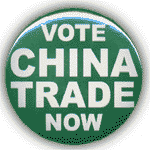
|
|
| Your future profitability is at stake: Urge Congress
to Approve Permanent Normal Trade Relations for
China |
|
| Contact your Congressional Representative before May
22. |
|
| Call the Business Coalition for U.S.—China Trade
Hotline, toll-free at 1-877-611-8723. |
|
|
|
|
|
|
Producer Profitability Linked to China
Trade Legislation |
| "I’d rather
not think about what might happen to the price of U.S.
soybeans if Congress doesn’t approve Permanent Normal
Trade Relations for China," said ASA First Vice
President Tony Anderson, a producer from Mount Sterling,
Ohio. "China is now the largest export buyer of our
soybeans. They’re a billion-dollar customer of our
soybeans and soy products. A loss of any market that
size would dramatically impact the price we get for our
soybeans."
Last year, China purchased
nearly $900 million dollars of U.S. soybeans, soybean
meal and soybean oil. Since the current marketing year
began on Sept. 1, 1999, China has already purchased more
than 128 million bushels of U.S. soybeans, a 160 percent
increase over all of last year, a 204 percent increase
over the same period last year.
"I was very impressed with
what I saw during my recent mission to China," Anderson
said. "It takes an incredible amount of effort to
produce enough food to feed more than a billion people.
The Chinese I spoke with are very anxious to have a
steady supply of high-quality U.S. soybeans. They are
concerned that if Congress doesn’t give China normal
trade status U.S. farmers will get hurt and Chinese
consumers will have to pay more for food.
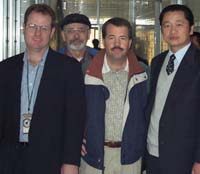 |
U.S.
soybean producer-leaders Chris Davis and Tony
Anderson recently met with U.S. soybean customers
in China to review current programs and discuss
future trade. China is now the largest export
buyer of U.S. soybeans. |
|
|
 |
USB/Asia Marketing Subcommittee
Chair Criss Davis, a producer from Shullsburg,
Wisc., and ASA First Vice President Tony Anderson,
a producer from Mount Sterling, Ohio, represented
U.S. soybean producers on a recent mission to
China to review progress on checkoff-funded swine
projects that have contributed to China becoming
the largest market for U.S.
soybeans. |
"Congress should stop
trying to use our farm products as some kind of foreign
relations bargaining chip. In this era of freedom to
farm, any kind of trade restrictions—particularly
sanctions and embargoes—come right out of the pockets of
U.S. farmers. We need free trade for our agricultural
products to compete in the global marketplace. I hope
Congress will not for some reason or another deny
farmers, and other industries, an opportunity to have
fair trade access to the China market.
"There are 1.3 billion
people in China that are potential consumers for
products we manufacture and grow and process in the
United States. Would we rather trade with these folks,
or would we rather try to set up a protectionist fence
around the United States? Without a trade agreement we
would not only deny the Chinese access to our markets
but we would also deny ourselves access to the market in
China."
If Congress doesn’t grant
China permanent normal trading status, U.S. farmers will
be disadvantaged in trading with China. Producers are
urged to contact their congressional representative and
voice their support for PNTR legislation before the
scheduled vote in the U.S. House of Representatives on
May 22.
View a list showing how your
congressional representative
voted. | | |
| |
|
|
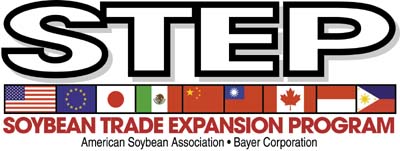
This
is a presentation of the ASA/Bayer Soybean Trade Expansion
Program.
|
|
|
.gif)
What Every Soybean Producer
Should Know about PNTR
.gif)
|
| U.S. soybean
producers have been promoting exports of soybeans to China
since 1982. During the last five years, China has gone from a
net exporter of soybeans to the biggest export buyer of U.S.
soybeans. Last year’s historic U.S.—China WTO negotiations for
agriculture will be a tremendous asset to U.S. farmers only if
Congress approves Permanent Normal Trade Relations (PNTR) with
China. |
| U.S. soybean
producers have a great deal to lose and much to gain by
continuing to trade with China. Of the $13 billion worth of
U.S. exports to China in 1999, nearly $900 million (more than
6 percent) was soybeans, soybean meal and soybean oil. Demand
for soybeans in China could double in the next five to ten
years. |
| U.S. producers
have made substantial investments of soybean checkoff dollars
and cost-share funding from USDA’s Foreign Agricultural
Service in development of the China market. If the U.S.
Congress fails to approve PNTR for China, the benefits of
increased demand for soybeans and soybean meal in China will
accrue to U.S. competitors in South America and
India. |
| Permanent Normal
Trade Relations (PNTR) is an extension of trading privileges
similar to those that have been approved by Congress on an
annual basis every year for the last 20 straight years.
Formerly know as Most Favored Nation (MFN) status, PNTR simply
formalizes China’s present trade status on a long-term
basis. |
| China is already
making important political, social and economic reforms. The
best way for the United States to continue to positively
influence policy changes in China is for Washington to
strengthen trade relations with Beijing. If the U.S. does not
establish PNTR with China, communications between the U.S. and
China will deteriorate, and U.S. producers will be
disadvantaged while China must source the products it needs
from other countries. |
| China already
has broad access to markets in the U.S. In 1999, the United
States imported six times more goods from China than China
purchased from the U.S. When China joins the WTO, the United
States will give up nothing, and stands to gain a great deal,
only if Congress approves PNTR status for China. |
| China's
membership in the WTO will foster development of a market-
based economic system. China will incur the responsibility to
bring its trade practices into conformity with international
rules and subject it to the WTO dispute resolution system.
This is important both in building the concept of rule of law
in China, and in improving a weak commercial legal system and
correcting practices, such as local officials interpreting
national law in different ways and discriminating against
imported goods. These developments will assist us in building
markets for U.S. agricultural products while
strengthening China's legal system. |
| An additional
benefit of China's membership in the WTO will be its
commitment to adhere to the rules of the WTO's Sanitary and
Phytosanitary Agreement and to specific science-based
requirements for any trade restrictions on food
imports. | |
|
Learn why the people in China
are depending on U.S. farmers to urge their congressional
representative to approve Permanent Normal Trade
Relations. |
|
|
|
Introduction |
|
For nearly twenty years, the American Soybean
Association has been building demand for U.S. soybeans in
China. Millions of checkoff dollars from U.S. farmers, and
millions of dollars in public funding from U.S. taxpayers,
have gone into the development of this market. That investment
is paying off handsomely as China is now the largest buyer of
U.S. soybeans.
View this introduction for an
overview of the importance of PNTR for China and to preview
the contents of the other seven videos available
below.
|
|
Beijing |
| Visit ASA’s international marketing office, the
minister-counselor for agricultural Affairs at the U.S.
embassy, and met the new ASA China assistant director at the
Forbidden City.
|
|
Shanghai |
|
Look at life in a modern
Chinese city, watch as U.S. soybeans are unloaded from a river
barge at Plant #1 and then listen to comments from local
leaders and industry representatives.
|
|
Aquaculture |
| See how aquaculture has
increased demand for U.S. soybeans.
|
|
Top
Beauty |
| Go
to the deep-water port of Dalian in northeast China, where you
will meet a local soybean buyer and watch as 55,000 tons of
U.S. soybeans are delivered.
|
|
Huanong |
|
Join in the celebration of a new crushing plant in
northeast China that is buying 500,000 tons U.S. soybeans this
year.
|
|
Chickens |
| Watch as U.S. soybean meal
is consumed at China’s largest egg layer
facility.
|
|
Guiyang |
| Our final stop will take you to the city of Guiyang in
far southwest China. Here you will meet a modern Chinese hog
producer, visit with two of ASA’s technical directors, and
with staff at a local feed mill that is buying U.S.
soybeans.
| |
|
|
|
|
Chart the Growth of China's Demand
for U.S. Soybeans |
|
|
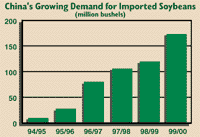 |
In the
last five years, China’s demand for imported soybeans has grown from
only 8 million bushels in 94/95, to 26 million in 95/96. Imports
jumped to 80 million bushels in 96/97, and up to 106 million bushels
in 97/98. This increased to 121 million bushels in 98/99, and for
the current marketing year, China is expected to import more than
176 million bushels of soybeans. |
|
|
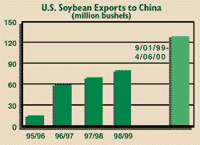 |
In marketing year 95/96, China
purchased more than 15 million bushels of U.S. soybeans, in addition
to quantities of U.S. soymeal and soyoil. In 96/97, exports jumped
to 59 million bushels. Exports volumes climbed to 70 million bushels
in 97/98, and 80 million bushels in 98/99. This year, as of April 6,
2000, total sales of U.S. soybeans to China are more than 128
million bushels— already a 160 percent increase over all of last
year, and a 204 percent increase over the same period last
year. |
|
|
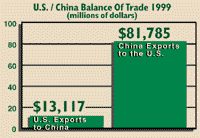 |
In 1999, the United States
exported slightly more than $13 billion to China. During the same
period, China exported more than $81 billion to the United
States. This six-to-one trade
deficit is a clear indication that the United States needs greater
access to the China market. |
|
|
 |
Demand for
soybean meal in aquaculture continues to grow in China. Feeding
trials designed by the American Soybean Association are showing
local fish producers how they can increase their profitability by
using high quality U.S. soybean meal. The amount of soybean meal
consumed has doubled in the last five years and is projected to
double again in the next five years. |
|
|
|
Your
future profitability is at stake: Urge Congress to Approve Permanent
Normal Trade Relations for China. Contact your Congressional
Representative before May 22 or call the Business Coalition
for U.S.—China Trade Hotline, toll-free at 1-877-611-8723 to
automatically generate letters of support that will be sent to your
representative.
Or click here
and select the House link on the following page to send an email
message to your Representative.
UPDATE: May 24, 2000,
Washington, D.C. The U.S. House of Representatives has
approved H.R. 4444 granting Permanent Normal Trade Relations for
China by a vote of 237 to 197. The legislation now goes to the
Senate, where passage is anticipated, and then to President Clinton,
who strongly supports the bill. Thanks to all who contacted their
representatives to express support for this critical trade
legislation.
View a list showing how your congressional
representative voted. |
|
| |